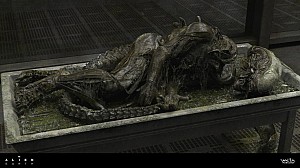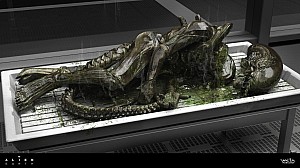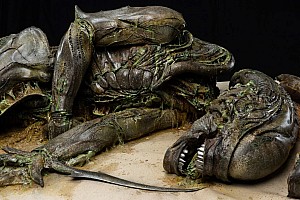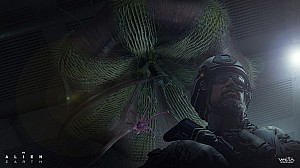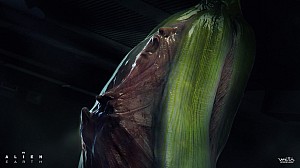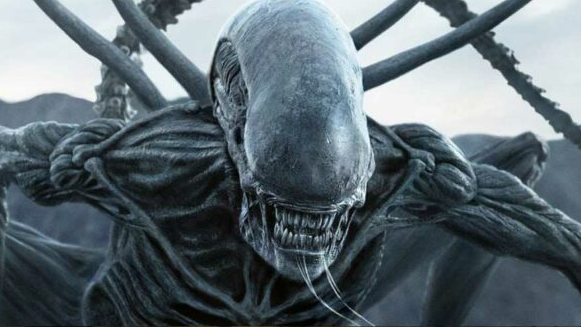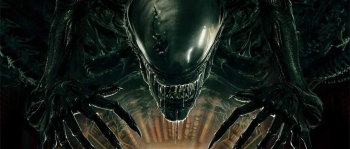
THR: You recently received NATO's award as director of the year, and "Aliens" has grossed over $77 million. Do you have any projects on the back burner that your "Aliens" success could help get off the ground?
JC: Basically, I've kind of pulled back. I don't want to set up deals with anybody until I have a property to do. So I'm going to finish these scripts first, write them on spec. I've actually got like 10 ideas right now that I'm working up into short treatments, and then I'll talk about them with my wife Gale, and we'll decide which ones we want to go ahead and do scripts on. Then I'll do a long-form treatment, about 45 pages, which is the way I like to work out all the bugs - that's what I've done on all of them. Get the major characters, get the scenes, get a feel for the story. Then for me, going to script, is not such a big deal. It's more of a working process as opposed to facing the blank page, the intimidation of the blank page.
THR: You've formed Tech Noir with your wife to produce films. How about projects for that company, don't you have a deal with Fox?
JC: I don't have any deal whatsoever with Fox. Gale does have kind of a housekeeping, first-look deal. She has an office on the lot and I believe she's in development with Fox on two pictures -this is not Tech Noir, just her as a producer. Tech Noir is more an umbrella entity for any picture that we do together.
THR: That was the name of the disco in "The Terminator," right?
JC: Yeah, we kept the name. That disco was downtown and people kept coming in off the street while we were filming, wanting to dance. They thought it was a good deal.
THR: You started back in college. Was that your entree into filmmaking?
JC: I was actually more of a novelist at that time. I wasn't really thinking toward screenwriting. And I got in with a bunch of friends, writers. Basically, they're still my only kind of real friends now. They're the same people I started out with back in Orange County. They're writers now, they've done a few things. wrote novels. A lot of unsold screenplays. Boy, when you think of how many scripts are written a year and how many get made...
THR: Those figures never discouraged you, though.
JC: Fortunately for me as a writer, I kind of had the practical wherewithal to put things into actuality, but a lot of people don't have that. This friend of mine down in Orange County where I went to college had gotten in touch with a group of dentists who wanted to tax shelter some money, and they wanted to do low budget feature films. And we proposed ten ideas for them -they were all pretty commercial exploitational-type things, but if you're gonna make a movie for $150,000 that's what you come up with. This is when we had no contact with the business. We were totally rank amateurs. If you're working in Orange County, you might as well be in Montana from the standpoint of being connected with the film industry. But they surprised us by picking the one idea we thought was the least likely they'd pick, a science fiction concept that involved a lot of spacecraft. machinery and hardware. So we thought, "Heck, if they want to do that, fine." So we got them to put up like $20,000 to make a short segment, 10 minutes long, in 35mm. We said we'd do it just like it's part of the movie. If they make the film, we'll cut it in. If they want to change actors, we'll still use the effects. So we did. We spent four or five months making this ten minute short, all in 35mm special effects. There were some pretty good effects shots in it -it kinds of creaks along and didn't work that well
THR: But it looked like a movie.
JC: Yeah, it looked like a movie. And we ran it in some of the local theatres and pretty much got bitten by the bug of filmmaking. The thing I remember about that shoot is that we spent the first half-day of the actual shooting trying to figure out how to load the camera. Nobody knew how to load a 35mm camera. And we didn't want to call up the rental place and say that we didn't know how to run the camera or they'd come down and take it away from us. So we had to figure it out the hard way -"If it goes over this sprocket then it should go over this next one" - we finally figured it out, got it running. The first shot I think we did was a match shot, one that I don't think I'd even try to do now. It was a complicated glass shot. I also spent some time working on the script for that. And this all went nowhere, but it was training. I used that film as a reel in applying for jobs as an effects technician - I wasn't talking director. I wasn't going in and saying "filmmaker." I was saying, "I can build miniatures, I can work an effects camera, I know a bit about animation" - that sort of thing. I had done a lot of rotoscope animation of laser beams, things like that. The film had a lot of stuff in it. Then I got a job working for New World, the old New World, on "Beyond the Battle of the Stars." I pretty much got in on the ground floor over there. I started in miniatures and created my own department of process projections.
THR: Your physics background and technical skills paid off with Corman.
JC: Well. it's funny, I'd never worked on a big film, a feature film. To me, that was a big film. I immediately sensed this weakness in the way they'd structured it. They had the director over here with the actors and they were talking, and they had the special effects people over there, and they never talked to the director at all. There was no interface, no plan to put the actors into any of the effects scenes. So I went to Roger - that was pretty ballsy, considering that Roger was never around. He was always up in the office over on San Vicente, and we were working down in Venice. I told him that they really had to do some sort of process projection and that I could rig up a projections system for them, which I was an expert in. This was all bullshit because I basically could never have afforded to get the materials to become an expert in it. I got him to spring for some of the 3M screen material. So we built a big screen, and I drew up some blueprints and engineered a front projection rig, and we had it built outside for $600 or something like that. The thing's still in use today. It worked really well. In fact, we updated it on "Escape From New York" with a 70 mm projector to use for John Carpenter. It worked well. It's actually one of the best ones that I've used. I've used some of the ones in England since then -actually, it's just luck that it went together.
THR: Being an outsider and a little brash worked out for you?
JC: Exactly. I didn't know enough to know that I wasn't supposed to be able to do that. Somewhere in there, I made the transition to art director. They had to fire the art director off the picture. He just wasn't coming up with the sets. They were about three days from shooting, and he had only built enough sets to cover the first week of shooting. None of the ones after that had even been designed.
THR: Your art direction, the sound, the set design are particularly integral to your films.
JC: I got a lot of good experience working for Roger, not only on that film but as a designer on "Galaxy of Terror." What you learn working for New World, and on that type of film, is just 'Go for it.' There's always a way to get it done and to make it presentable. That kind of low budget mentality has kind of continued with both Gale and me. I think it teaches you that you can probably get by with a lot less than you think. If push comes to shove and there's a crunch, you can still shoot. There's still a way to get the scenes, even if you do a closeup. Roger's proved that time and time again. More importantly, it taught us to pick our battles, to not just keep throwing money at a movie. You decide in advance where you want to spend your money, where you want to put it up there for the audience's visual enjoyment and where you can pull back and let the characters tell the story. I was lucky and wise enough to get teamed up with Gale at New World. She was a doer. With "Aliens" she was playing big league ball with Diller and Larry Gordon. I think her biggest strength on "Aliens" was that she proved to the studio that she knew what she was doing. She interfaced really well with legal affairs and business affairs. In fact, she's still friends with all those people, and actually did a lot of work for them - not that they needed to have their work done for them - but more than most producers, she made sure contracts were all in good shape, and early on. So they were able to have the faith to kind of leave us alone. Gale pretty much kept them apart from me during the entire shooting. We never had any major crises on the film, and they didn't feel there were any crises on the dailies.
THR: Everyone seemed to think the dailies were sensational.
JC: Yeah. It's curious to me. I know that the people who saw dailies really liked them, but at the same time they still considered "SpaceCamp" to be their big picture for the summer and were putting all their guns on that. I don't understand that. They were really pushing it. They pushed the hell out of "SpaceCamp" and it's not because they felt they had to back a dog because that's not the way Fox works. They had seen a rough cut of that picture, long before it was done before any of the effects were in it, and they honestly thought that they had a hit in that film. The thing that I don't understand is - and I hate to talk about other people's pictures - is that it seems to me that most of the things that were wrong with that movie were inherent within the story and in the script - that sort of thing. The special effects didn't destroy it for me because they were right up to stuff. It felt creaky - I felt the script too much.
THR: You got the background in art design. How about the story structure? Both "Terminator" and "Aliens" moved so fast. The narratives are tight.
JC: I don't know where that comes from. Probably just the way I think to an extent, The very first script I wrote, which I co-wrote with a friend of mine, made me very aware of structure. So, I'm still very conscious of that. From an editing standpoint, I've never really worked as an editor. I think when you do effects and when you do second unit direction you kind of learn to edit through storyboards. If you have to storyboard out a scene, you are essentially shooting a scene in advance. In special effects, you don't do coverage. You have to very, very accurately predict the scene in your mind and be in full agreement with the director and everyone on how the shots are going to cut because you don't shoot more than an extra couple of frames. When they talk about handles on an effects shot, they talk about two or three frames on each end. So I think I learned all my editing kind of by the back door, by doing effects work. On "Terminator" I was fortunate enough to work with Mark Goldblatt, who I think is a very good action cutter, and I learned a lot of the tricks of the trade from him. You have to think backwards to a certain extent. You have to know how you're cutting is going to work for you. I think that helps you to save a lot of money -you don't have to actually create something happening. You don't have to labour to get something to happen - you can break it up into pieces of action. I find that actors can do a lot of their own action if you can break it up if you know how you're going to put it together later.
THR: So they don't over-strain, that sort of thing.
JC: Right. Exactly. Quote unquote, 'doing their own stunts.' But they'll be one moment in there where it's not the actor, it will be the stuntman. I learned that lesson in reverse on "Terminator." I had Michael Biehn training really hard for that picture, he was taking a lot of martial arts. He was getting very physically confident so that he could do rolls, falls and things like that. In the shootout scene in the disco, that shot where he came diving right over the camera with a shotgun and does a snap roll on the hard floor of the disco and leaps up as bullets are going off all around him and comes to a standing position, at that moment you see that it's definitely Michael. It was all one shot. It was a beautiful shot in dailies. Mark cut the scene and I looked at it, and the shot where he snap rolls over the camera is intercut with Terminator firing -it could easily have been the stuntman. I thought, well, I'll do it that way from now on -why risk having the actor break his arm?
THR: For a rival to Schwarzenneger, you need a guy in shape, to say the least.
JC: Exactly, Michael had learned to fall so well he never got a scratch on him. He thanked me afterwards for having him do that. Initially, he had been very sceptical -at the beginning, he said: "I'm an actor, I don't need to do that." But it changed his outlook on his character, made him more aggressive, more feral. I wanted him to be very feral.
THR: Do you storyboard everything?
JC: Not really. I storyboard any action scene that may be so complicated I need a series of pictures to show the stuntmen how I want it done, or especially if there's second unit material to be cut in with my material. I try to be as accurate as possible on those, even to the extent of going through four frames of a given shot. But, primarily I use storyboards to communicate with other people. If I'm doing a scene 100% by myself, I won't do boards. I'll do little thumbnails for myself on the back sides of my script pages, but I won't do storyboards. Like in "Aliens," the battle in operations when the creatures all came through the ceiling, I shot basically all of that myself. I didn't board that at all. But the scene where she takes over the control of the APC and drives it through the whole structure, that was heavily storyboarded because we were intercutting the full-size action I was shooting with miniatures - they had to get the screen direction, the size of the frame, all of that.
THR: People have asked if there ever be a storyboarded version of "Aliens" available to the public, kind of a comic book form of the movie.
JC: I always wanted to be a comic artist when I was a kid. I trained myself to draw human figures and draw them in perspective from copying comic books. I think that that's my strongest training in visual narrative. I've been going back and looking at comics, especially some of the European comic artists, the ones that are in Heavy Metal magazine, things like that. It's very cinematic. They use the close-up, medium shot, wide establishing shot, inserts, everything -it's all the same basic visual approach to narrative structure.
THR: Your rhythm is so fast. Where does that come from?
JC: I don't know where that really comes from, watching films that I really like. I wouldn't say studying them in the sense of putting them on the VCR and going backwards and forwards, although I did do that with "Road Warrior." That picture was one of the few pictures -I have this curious reaction sometimes when I see a film -it's almost like a Jungian experience where I'm seeing a film that I've already seen in my mind. That's happened to me twice. The first one was 'Star Wars' and the second one was "Road Warrior." When I saw "Star Wars" it wasn't like a universe unfolding to me that I'd never seen before, but it was like something I'd seen before. I used to listen to fast electronic music and see dogfights in space, that sort of stuff. I wanted to do it. I always felt if I got to be a filmmaker I would do that sort of thing. But at the time "Star Wars" came out I had no plans to work in film. This whole thing with the dentists came afterwards. In fact, it was as a result of the success of "Star Wars" that they wanted to do science fiction.
THR: Up until then it was out of vogue.
JC: Right. In a way, I suppose I owe it all to George Lucas. He made science fiction a viable genre again.
THR: Do you think "Howard The Duck" might kill off comics being made into movies?
JC: I tend not to think in terms of trends. I think "Howard The Duck" just wasn't a good film. I think that there was something fundamentally lacking in that movie. The duck suit looked had. You didn't care about the main character.... George Lucas, you don't know - maybe he's overextended. Anyway, maybe it was a good lesson to learn. Gary Kurtz, who produced "Star Wars," filed for bankruptcy - I guess it's kind of good to stay humble and stay working.
THR: Any story or genre that you're thinking of doing that might surprise people?
JC: I've got one I'm working on. 1 don't want to talk about it too much because it might not work out. But it's a comedy, a comedy in the broad style of "Beverly Hills Cop," which is basically a realistic story. Eddie Murphy was inserted, and they did it funny. That's the kind of comedy that I could get into.
THR: Not a drawing room comedy?
JC: No, and not a Monty Python type thing or what the Zuckers do is really up my alley. But even the Zuckers did "Ruthless People," which was basically a realistic story. I've always had a good time with actors, bringing that comedy out and just holding it. The problem with doing a comedy, you sell it as a comedy and people expect too much. It's a big challenge. It's kind of a wall in a way. I'll just experiment with it. Again, if I see it on the page, then I'll go for it. There's humour in "The Terminator," and there's humour in "Aliens," it's just a matter of shifting the balance and elements. I found with "Aliens" that once the characters came alive, I had to throw out 90% of the dialogue. I could have just written funny dialogue for them all day long. I had to pull back. Plus, in a film like that you've got to have that balance of impulses: the suspense, the thrills, the shocks, the comedy, the character development, Obviously, the most important story was Sigourney's but she wasn't that funny she was the straight man to all the others. Which is funny because Sigourney herself is very funny she's a hoot and she likes comedy. So it was hard for her to have all those good lines going to everybody else.
THR: You had stock characters in "Aliens," hut they came alive, you transcended it. How did you work that?
JC: If you know you're doing a clichŽ you adjust. What I tried to do with the soldier was paint an obvious cliche in an unfamiliar context so people actually got entertainment value out of the recognition of who these people were supposed to be in a very easy and familiar way.
THR: How about Rambo? A lot of people see that character as a cartoon figure. You got screen credit on "Rambo II."
JC: Well, I came rather late to that. I actually thought the first one was a pretty good film. That's what attracted me to the second one, the underdog story. I was kind of fascinated by Vietnam at that point and what a weird and surreal kind of war that was. So my approach to it was a lot heavier, a lot more character. I just ran into Sly (Stallone) recently, and he was saying that when he looks back on it -although he doesn't have any regrets, in a way he wished he could have done the script that I wrote because they did wind up throwing out about the first half of it. They kept a lot of the action. They just kind of made it a "Mission Impossible" thing -for me it took on kind of a superhero-type quality. I thought it was much more interesting to kind of explore this traumatised character. Maybe I'll get to use that stuff somewhere else. I used a bit of it in "Aliens," having them come back from something they were traumatised by. There was a bit of that delayed stress syndrome stuff in "Aliens" they didn't use in "Rambo II."
THR: What recently has attracted you?
JC: What did I see recently that I liked? "Running Scared" - those two guys clicked great in the best tradition of the buddy movie. That dry humour, but it didn't seem to catch fire. It had some structure problems.
THR: The travelogue in the middle?
JC: Yeah, it was like there was a video in the middle of the movie. People try to draw on trends, but it's really not trends, it's about movies. You can make a good movie about anything. "Rocky" came along when people thought the fight movie was dead as a doornail. But it was basically a good film. It worked. Basically, it just has to be the right combination of a good script, a good cast, and half-way decent filmmakers.
THR: You think very strongly in terms of the script obviously.
JC: Studios don't like to think in those terms because it puts too much pressure on instinct. It puts too much responsibility on the writer, the producer and the director. They (studio executives) like to be able to quantify in a scientific way - you know this star and this star. To me, "Legal Eagles" is the classic thing: You know, we've got Ivan Reitman and he made $200 million with "Ghostbusters," and we got Robert Redford and Debra Winger, and we got a script by so-and-so - so how can we go wrong? We've got to make $150 million, right? I wouldn't want a studio (executive) job for anything. Have to risk your ass on somebody else's film that they have to go out and make.
THR: How about directors who've influenced your work?
JC: That's always a hard question for me. Because people say, "Oh, he was a big Hitchcock fan," and then they go and look at the films and say there's a direct relationship - he kind of uses this type of scene structure or this type of shot. For me, I was a fan of movies for so long, compared to the actual amount of time I've worked in them, that it's really kind of like the only image is that all that stuff has been thrown into a big Cuisinart and it's been all blended together into a kind of puree.
THR: So it comes out on the wall?
JC: Right, on the screen. In "Aliens," I consciously imitated a shot in "The Third Man" where the fingers come up through the grill. I was inspired by that shot. But for the most part, it's like all the films that I've seen. I admire the work of certain directors without consciously emulating them. I've gone back and rediscovered things about Howard Hawks or John Ford that I hadn't really realised even when I was getting started. When I got started in film it was pure technolust. I just wanted to learn how all that stuff was done on a technical level as opposed to an aesthetic level.
THR: Especially mixed comedy and terror.
JC: He gets into some amazing grey area where you don't know whether to laugh or scream.
THR: Howard Hawks...
JC: I don't know. Other influences? I think Kubrick was a big influence on me. He just completely used all of the breadth and the width of film in all its possibilities. That's what I always liked about him, all of his films were so different in style. Every one of his films seemed to he done by a different person. His vision is just so powerful. His whole methodology is inspirational -I wouldn't want to work that way myself, I think I would go mad. "2001" had a very direct specific effect on me when I saw it at the age of 15. It inspired me to find out how things were done technically, how you could actually achieve that imagery on film. Of course, I knew none of it really existed - it was just an all-in-one moment wallop - this is the possibility of what you can do with film technology. I wanted to know how it was done. No film before that had ever hit me between the eyes that way. Certain other concepts in terms of how music is used in film and the kind of emotional response you can get from that to create a total environment.
THR: Your films are rich with sounds: machinery grating, water dripping, metal clanging.
JC: Film is not a tactile experience, but you can be made during a film to have a sense memory of what it was like when you were in a similar environment when you heard water dripping. You can cue the audience to their own memories and experiences. That way it makes it a "feely" - you know from the Aldous Huxley hook, "Brave New World." In a "feely" you could physically experience what was going on. You can't do that, of course, but you can trigger off specific memories and the audience can fill in, even if it's a completely fictional environment, a place where they've never been or never will be. That goes back to the whole idea of subjectivity, trying to project the audience into the picture. I don't think Hitchcock spent a lot of time on that, just as an example. I don't think it was important to him. He would use music to create a specific emotion. But he also liked that kind of high, God-like camera position with people-like figures on a gameboard. And he would also like the audience to know at all times these elements. I think suspense is based on the audience knowing something is going to happen.
THR: Some recent movies seem to be subservient to the effects.
JC: I think that is sometimes true. There's the tendency to say the story is too simple, so let's dress it up. But you can't dress it up. The dressing should always be secondary. When I see "Aliens" now I see I didn't use the sets quite as well as I could have. The sets are really better than they look in the movie. In my Roger Corman days, we always used the photography to make the sets look better than they really were. I think I focused so much on the story and characters that I never really pulled away in long shots to show the sets. Also, there's about 10 minutes of film that was cut, and it just happens to be part of the film where I did a lot of establishing shots. It's all in one long sequence. There's some talk about restoring that for network TV. They want to stretch it out and fill a timeslot.
THR: In "Aliens," it was predictable, but it was still startling. Now with all the MTV-type kids, how do you keep them on the edge?
JC: I don't know how MTV is doing now. I was really fascinated by it right after its inception. I always wanted to watch it. I thought of it the same way I think of a really good commercial, compressed and stylish work. You might get 10 or 12 great shots throughout a feature film that is memorable, but in a rock video, you get all those 10 shots in two minutes. But after a while, MTV just became nothing. Now I can't even watch them. There's no story. There's no involvement. It all goes back to the basic thing -you draw people in with a good story. "The Terminator," for instance. The production values are not that great - I think we did a good job for the money that we had -but it's not a visually stunning picture. But you get drawn in and you're satisfied visually because you believe what is happening is real, or at least you're intrigued with the possibility that it's real. It boils down to the story. I've talked to people who didn't see it when it came out but watched it on HBO, and they'd be listening to it, watching it in the background and it would seduce them to watch it. When I was writing it I remember I thought of it as knitting, where each scene connects to the next scene. Each scene would answer a previous question and then ask a new one. Storytelling's a matter of withholding information, giving some out, asking the questions and then answering them. With "Terminator" I kind of knew what I was doing and it worked. Whether I can apply it to the next story remains to be seen.

David Giler: Cinefantastique Interview
David Giler, who wrote scripts for MYRA BRECKINRIDGE, THE PARALLAX VIEW and FUN WITH DICK AND JANE, always seemed to get his office located down the h...

David Giler Alien 3 Starburst Special Interview October 1992
Alien 3 screenwriter David Giler guides us on the terrifying journey from script to screen. Why was there a third Alien movie? What were all the re-wr...

Did Alien 3 rip-off The Element of Crime?
In 1984, Danish filmmaker Lars von Trier (Melancholia, Dogville) began his directorial career with The Element of Crime, his first feature film. ...



